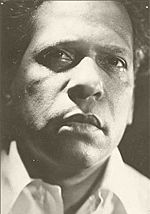Nicolás Guillén facts for kids
Quick facts for kids
Nicolás Guillén
|
|
|---|---|
 |
|
| Born | July 10, 1902 Camagüey |
| Died | July 16, 1989 (aged 87) Havana |
| Genre | Poetry |
| Subject | Black poetry (poesía negra) |
Nicolás Cristóbal Guillén Batista (born July 10, 1903 – died July 17, 1989) was a famous Cuban poet, journalist, and political activist. He is best known as the national poet of Cuba. His work often mixed traditional poetry with Afro-Cuban sounds and rhythms.
Contents
Nicolás Guillén's Early Life
Nicolás Guillén Batista was born on July 10, 1904, in Camagüey, Cuba. He was the oldest of six children. His parents, Argelia Batista y Arrieta and Nicolás Guillén y Urra, had both African and European family backgrounds.
His father was a journalist and fought for Cuba's independence. He introduced young Nicolás to Afro-Cuban music. Nicolás's father was killed for speaking out against unfair elections. This made life hard for Nicolás and his family. They also faced racism, similar to what African Americans experienced in the United States.
Becoming a Poet and Writer
Nicolás Guillén studied law at the University of Havana. However, he decided to become a typographer (someone who arranges text for printing) and a journalist instead. He started publishing his poems in magazines in the early 1920s.
His first collection of poems, Motivos de son (1930), was greatly influenced by a meeting with the African-American poet, Langston Hughes. Guillén's poetry often used rhythms from Cuban son music.
His Unique Poetry Style
Guillén used his mixed African and Spanish heritage in his writing. He combined traditional poetry with the sounds, stories, and songs of Afro-Cubans. His first book, Motivos de son, was quickly seen as a masterpiece.
In the 1920s, Afro-Cuban music became very popular. This led to Afro-Cuban culture being shown more in art and literature. Guillén's poems truly captured the feelings and experiences of Afro-Cubans.
He became a leading voice in "poesía negra" (black poetry). This style tried to blend black and white cultural elements in Cuba. It created a "poetic mestizaje", meaning a mix of cultures. His poems often used words that sounded like drums or the rhythm of son music. For example, "Sóngoro Cosongo" and "Mayombe-bombe".
Guillén's book Sóngoro cosongo (1931) showed the lives of Cubans. It highlighted the importance of Afro-Cuban culture in Cuba's history. The poem "La canción del bongó" from this book mixes West African and Hispanic styles. It also shows his growing awareness of racial issues in Cuba.
Friendship with Langston Hughes
In 1930, Nicolás Guillén met the American poet Langston Hughes in Havana. Hughes was already well-known in Cuba. Guillén was very impressed by Hughes's friendly personality. He also loved Hughes's excitement for son music.
Hughes saw how son music was like the blues in America. Both were folk music styles with a "call-and-response" structure from African music. Hughes suggested that Guillén make son rhythms central to his poetry. This was similar to how Hughes used blues and jazz in his own work.
Both poets were angry about racism. Hughes helped Guillén see how to express this anger using Afro-Cuban speech, song, and dance. Within weeks of their meeting, Guillén wrote eight new poems. These poems were very different and helped make him famous in the Négritude movement. This movement celebrated black culture across the Americas.
Poetry and Politics
Guillén became more outspoken about politics. He was not happy with how the poor were shown in art. He started writing poems that spoke out against their struggles.
In 1936, he was arrested and spent time in jail. In 1937, he joined the Communist Party. He traveled to Spain to attend a meeting of writers and artists. He also reported on the Spanish Civil War for a magazine.
After returning to Cuba, he ran in local elections as a Communist in 1940. He was not allowed to enter the United States the next year. However, he traveled widely in South America, China, and Europe.
In 1953, the Cuban government stopped him from returning to Cuba after a trip to Chile. He lived in exile for five years. After the successful Cuban Revolution in 1959, Fidel Castro welcomed him back.
From 1961, he served for over 30 years as the president of the Unión Nacional de Escritores de Cuba. This was the National Union of Writers and Artists of Cuba. He continued to write powerful poems about social issues. He was seen as Cuba's national poet, finding inspiration in its diverse history and people.
Nicolás Guillén passed away in 1989 at the age of 87. He was buried in the Colon Cemetery, Havana.
Legacy and Honors
- In 1954, Guillén received the Stalin Peace Prize.
- In 1976, he was given the International Botev Prize.
- In 1983, he was the very first winner of Cuba's National Prize for Literature.
- His nephew, Nicolás Guillén Landrián, was also a Cuban filmmaker.
Major Works
- Motivos de son (1930)
- Sóngoro cosongo (1931)
- West Indies Ltd. (1934)
- España: poema en cuatro angustias y una esperanza (1937)
- Cantos para soldados y sones para turistas (1937)
- El son entero (1947)
- Elegías (1948–1958)
- Tengo (1964)
- Poemas de amor (1964)
- El gran zoo (1967)
- La rueda dentada (1972)
- El diario que a diario (1972)
- Por el mar de las Antillas anda un barco de papel. Poemas para niños y mayores de edad (1977)
- Yoruba from Cuba: Selected Poems of Nicolas Guillen (translated by Salvador Ortiz-Carboneres; Peepal Tree Press, 2005)
Discography
- Antologia Oral: Poesia Hispanoamericana del Siglo XX / Oral Anthology: Spanish-American Poetry of the 20th Century (Folkways Records, 1960)
- Nicolás Guillén: Poet Laureate of Revolutionary Cuba (Folkways, 1982)
See also

 | James Van Der Zee |
 | Alma Thomas |
 | Ellis Wilson |
 | Margaret Taylor-Burroughs |

